Legal Analysis of Contracts and Liabilities - Recaf Pty Ltd Task Two
VerifiedAdded on 2023/04/23
|6
|1459
|324
Report
AI Summary
This report analyzes two legal matters faced by Recaf Pty Ltd. Matter 1 examines the validity of a contract between Recaf and Carnival Pty Ltd, determining the liability for the loss of goods. The analysis focuses on acceptance through conduct, referencing the case of Reveille Independent LLC v Anotech International (UK) Ltd to support the conclusion that the risk of loss remains with Carnival Pty Ltd due to the specific mode of acceptance not being followed. Matter 2 assesses whether Recaf can claim $700 from WPL, concluding that the company cannot, based on the parking ticket's terms and conditions, and the lack of an agency relationship between the towing company and Recaf. The report cites relevant legal precedents and principles to support its conclusions.
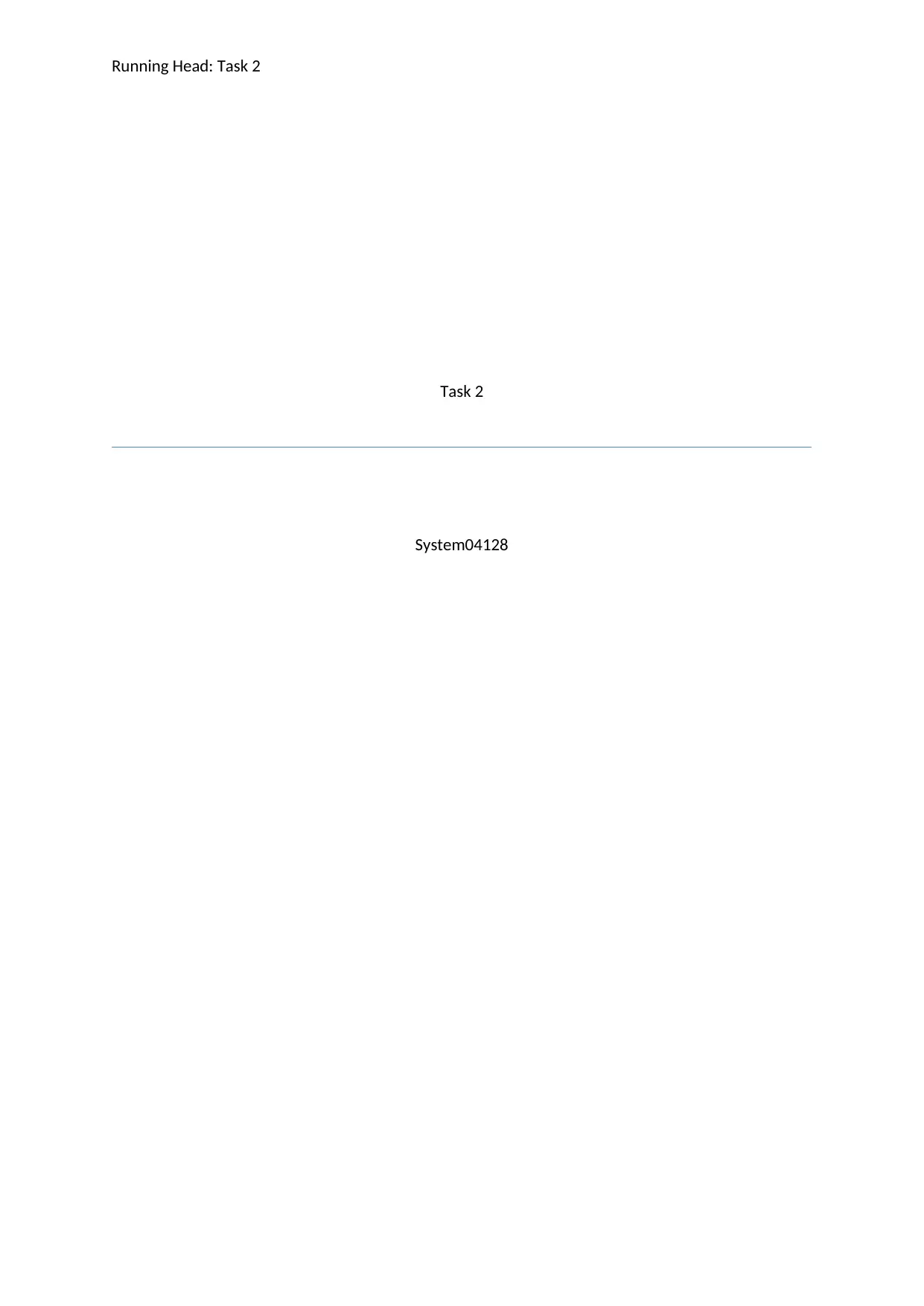
Running Head: Task 2
Task 2
System04128
Task 2
System04128
Paraphrase This Document
Need a fresh take? Get an instant paraphrase of this document with our AI Paraphraser

Task Two
Table of Contents
Matter 1......................................................................................................................................2
Matter 2......................................................................................................................................3
Bibliography...............................................................................................................................5
1 | P a g e
Table of Contents
Matter 1......................................................................................................................................2
Matter 2......................................................................................................................................3
Bibliography...............................................................................................................................5
1 | P a g e
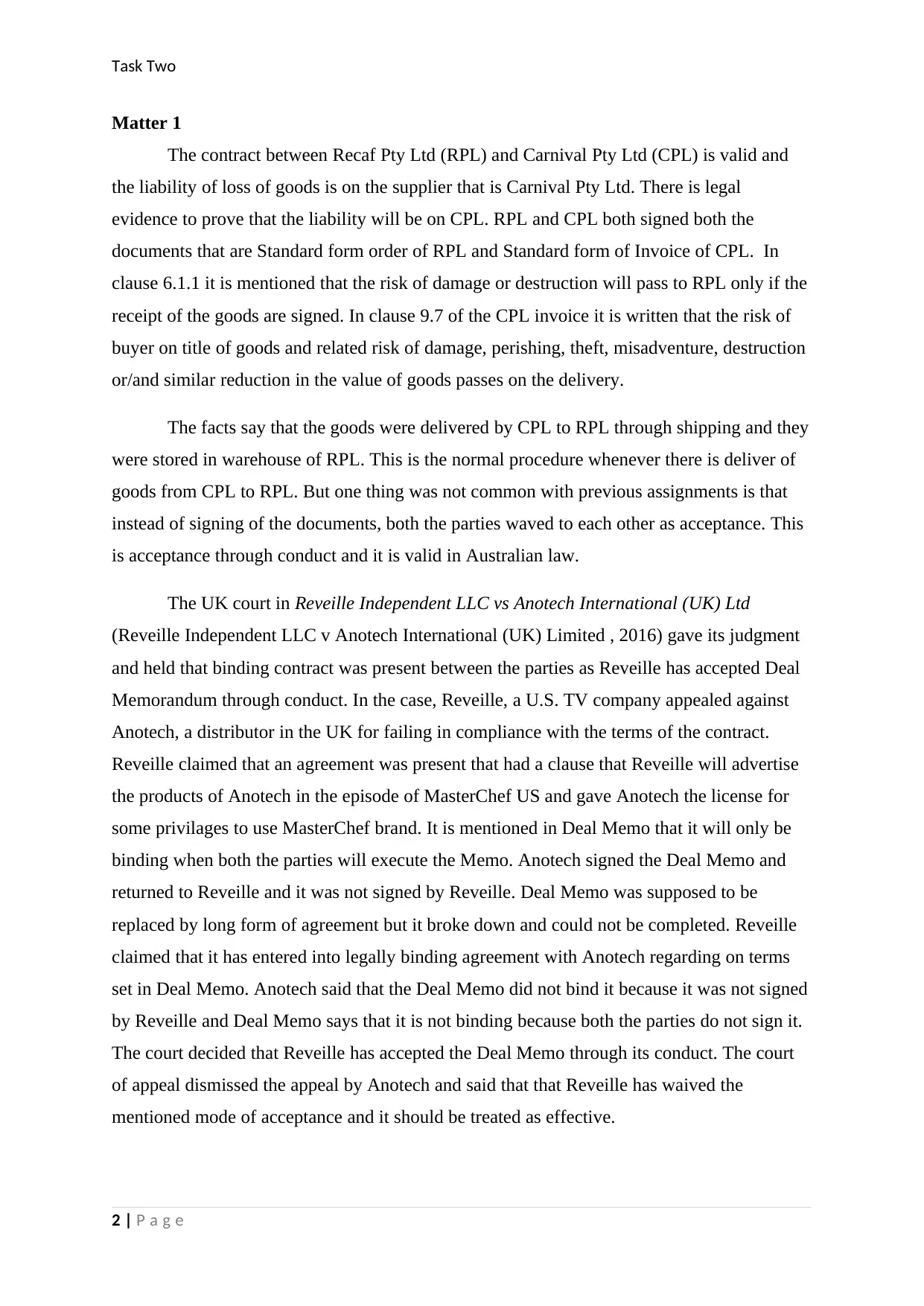
Task Two
Matter 1
The contract between Recaf Pty Ltd (RPL) and Carnival Pty Ltd (CPL) is valid and
the liability of loss of goods is on the supplier that is Carnival Pty Ltd. There is legal
evidence to prove that the liability will be on CPL. RPL and CPL both signed both the
documents that are Standard form order of RPL and Standard form of Invoice of CPL. In
clause 6.1.1 it is mentioned that the risk of damage or destruction will pass to RPL only if the
receipt of the goods are signed. In clause 9.7 of the CPL invoice it is written that the risk of
buyer on title of goods and related risk of damage, perishing, theft, misadventure, destruction
or/and similar reduction in the value of goods passes on the delivery.
The facts say that the goods were delivered by CPL to RPL through shipping and they
were stored in warehouse of RPL. This is the normal procedure whenever there is deliver of
goods from CPL to RPL. But one thing was not common with previous assignments is that
instead of signing of the documents, both the parties waved to each other as acceptance. This
is acceptance through conduct and it is valid in Australian law.
The UK court in Reveille Independent LLC vs Anotech International (UK) Ltd
(Reveille Independent LLC v Anotech International (UK) Limited , 2016) gave its judgment
and held that binding contract was present between the parties as Reveille has accepted Deal
Memorandum through conduct. In the case, Reveille, a U.S. TV company appealed against
Anotech, a distributor in the UK for failing in compliance with the terms of the contract.
Reveille claimed that an agreement was present that had a clause that Reveille will advertise
the products of Anotech in the episode of MasterChef US and gave Anotech the license for
some privilages to use MasterChef brand. It is mentioned in Deal Memo that it will only be
binding when both the parties will execute the Memo. Anotech signed the Deal Memo and
returned to Reveille and it was not signed by Reveille. Deal Memo was supposed to be
replaced by long form of agreement but it broke down and could not be completed. Reveille
claimed that it has entered into legally binding agreement with Anotech regarding on terms
set in Deal Memo. Anotech said that the Deal Memo did not bind it because it was not signed
by Reveille and Deal Memo says that it is not binding because both the parties do not sign it.
The court decided that Reveille has accepted the Deal Memo through its conduct. The court
of appeal dismissed the appeal by Anotech and said that that Reveille has waived the
mentioned mode of acceptance and it should be treated as effective.
2 | P a g e
Matter 1
The contract between Recaf Pty Ltd (RPL) and Carnival Pty Ltd (CPL) is valid and
the liability of loss of goods is on the supplier that is Carnival Pty Ltd. There is legal
evidence to prove that the liability will be on CPL. RPL and CPL both signed both the
documents that are Standard form order of RPL and Standard form of Invoice of CPL. In
clause 6.1.1 it is mentioned that the risk of damage or destruction will pass to RPL only if the
receipt of the goods are signed. In clause 9.7 of the CPL invoice it is written that the risk of
buyer on title of goods and related risk of damage, perishing, theft, misadventure, destruction
or/and similar reduction in the value of goods passes on the delivery.
The facts say that the goods were delivered by CPL to RPL through shipping and they
were stored in warehouse of RPL. This is the normal procedure whenever there is deliver of
goods from CPL to RPL. But one thing was not common with previous assignments is that
instead of signing of the documents, both the parties waved to each other as acceptance. This
is acceptance through conduct and it is valid in Australian law.
The UK court in Reveille Independent LLC vs Anotech International (UK) Ltd
(Reveille Independent LLC v Anotech International (UK) Limited , 2016) gave its judgment
and held that binding contract was present between the parties as Reveille has accepted Deal
Memorandum through conduct. In the case, Reveille, a U.S. TV company appealed against
Anotech, a distributor in the UK for failing in compliance with the terms of the contract.
Reveille claimed that an agreement was present that had a clause that Reveille will advertise
the products of Anotech in the episode of MasterChef US and gave Anotech the license for
some privilages to use MasterChef brand. It is mentioned in Deal Memo that it will only be
binding when both the parties will execute the Memo. Anotech signed the Deal Memo and
returned to Reveille and it was not signed by Reveille. Deal Memo was supposed to be
replaced by long form of agreement but it broke down and could not be completed. Reveille
claimed that it has entered into legally binding agreement with Anotech regarding on terms
set in Deal Memo. Anotech said that the Deal Memo did not bind it because it was not signed
by Reveille and Deal Memo says that it is not binding because both the parties do not sign it.
The court decided that Reveille has accepted the Deal Memo through its conduct. The court
of appeal dismissed the appeal by Anotech and said that that Reveille has waived the
mentioned mode of acceptance and it should be treated as effective.
2 | P a g e
⊘ This is a preview!⊘
Do you want full access?
Subscribe today to unlock all pages.

Trusted by 1+ million students worldwide
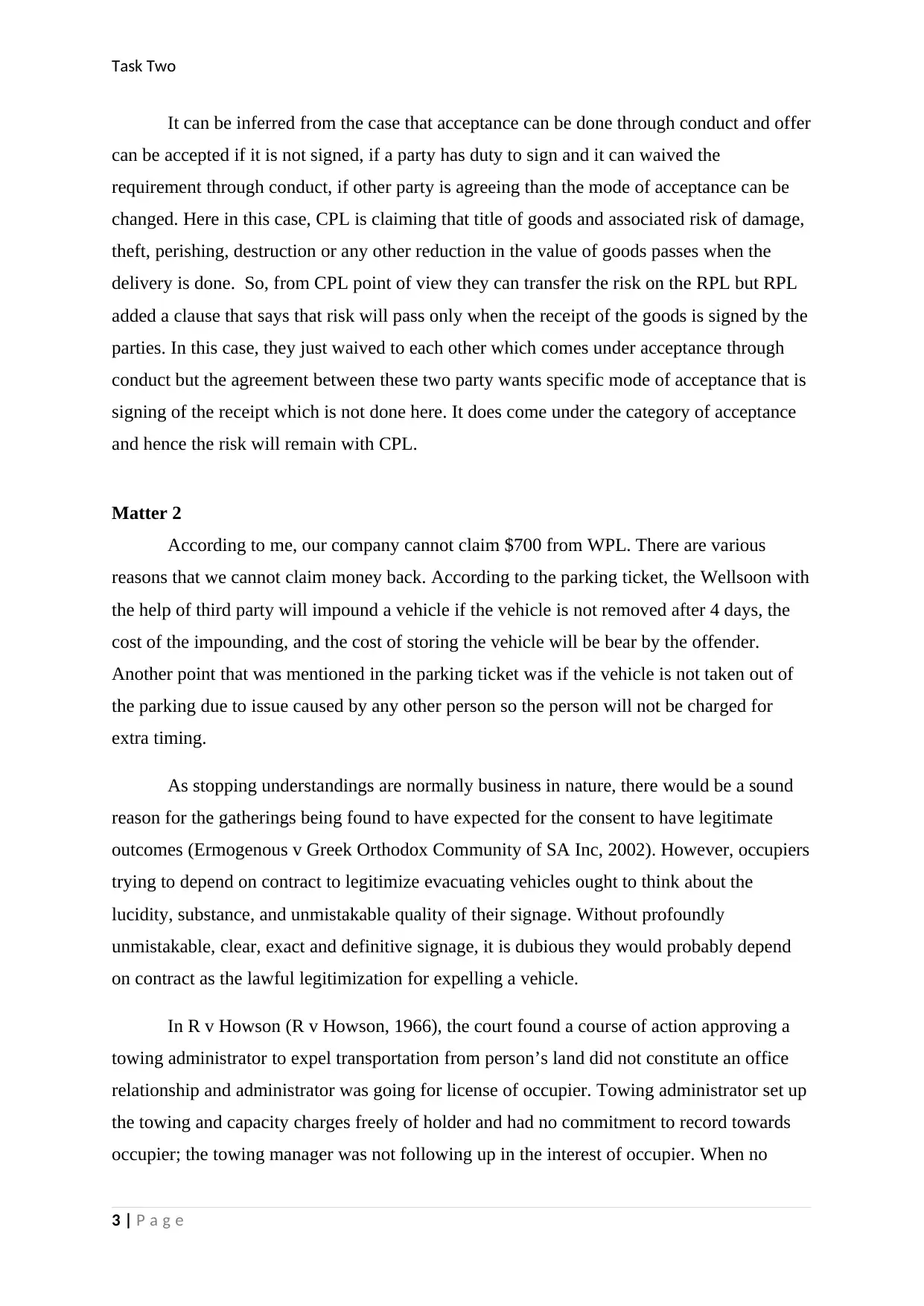
Task Two
It can be inferred from the case that acceptance can be done through conduct and offer
can be accepted if it is not signed, if a party has duty to sign and it can waived the
requirement through conduct, if other party is agreeing than the mode of acceptance can be
changed. Here in this case, CPL is claiming that title of goods and associated risk of damage,
theft, perishing, destruction or any other reduction in the value of goods passes when the
delivery is done. So, from CPL point of view they can transfer the risk on the RPL but RPL
added a clause that says that risk will pass only when the receipt of the goods is signed by the
parties. In this case, they just waived to each other which comes under acceptance through
conduct but the agreement between these two party wants specific mode of acceptance that is
signing of the receipt which is not done here. It does come under the category of acceptance
and hence the risk will remain with CPL.
Matter 2
According to me, our company cannot claim $700 from WPL. There are various
reasons that we cannot claim money back. According to the parking ticket, the Wellsoon with
the help of third party will impound a vehicle if the vehicle is not removed after 4 days, the
cost of the impounding, and the cost of storing the vehicle will be bear by the offender.
Another point that was mentioned in the parking ticket was if the vehicle is not taken out of
the parking due to issue caused by any other person so the person will not be charged for
extra timing.
As stopping understandings are normally business in nature, there would be a sound
reason for the gatherings being found to have expected for the consent to have legitimate
outcomes (Ermogenous v Greek Orthodox Community of SA Inc, 2002). However, occupiers
trying to depend on contract to legitimize evacuating vehicles ought to think about the
lucidity, substance, and unmistakable quality of their signage. Without profoundly
unmistakable, clear, exact and definitive signage, it is dubious they would probably depend
on contract as the lawful legitimization for expelling a vehicle.
In R v Howson (R v Howson, 1966), the court found a course of action approving a
towing administrator to expel transportation from person’s land did not constitute an office
relationship and administrator was going for license of occupier. Towing administrator set up
the towing and capacity charges freely of holder and had no commitment to record towards
occupier; the towing manager was not following up in the interest of occupier. When no
3 | P a g e
It can be inferred from the case that acceptance can be done through conduct and offer
can be accepted if it is not signed, if a party has duty to sign and it can waived the
requirement through conduct, if other party is agreeing than the mode of acceptance can be
changed. Here in this case, CPL is claiming that title of goods and associated risk of damage,
theft, perishing, destruction or any other reduction in the value of goods passes when the
delivery is done. So, from CPL point of view they can transfer the risk on the RPL but RPL
added a clause that says that risk will pass only when the receipt of the goods is signed by the
parties. In this case, they just waived to each other which comes under acceptance through
conduct but the agreement between these two party wants specific mode of acceptance that is
signing of the receipt which is not done here. It does come under the category of acceptance
and hence the risk will remain with CPL.
Matter 2
According to me, our company cannot claim $700 from WPL. There are various
reasons that we cannot claim money back. According to the parking ticket, the Wellsoon with
the help of third party will impound a vehicle if the vehicle is not removed after 4 days, the
cost of the impounding, and the cost of storing the vehicle will be bear by the offender.
Another point that was mentioned in the parking ticket was if the vehicle is not taken out of
the parking due to issue caused by any other person so the person will not be charged for
extra timing.
As stopping understandings are normally business in nature, there would be a sound
reason for the gatherings being found to have expected for the consent to have legitimate
outcomes (Ermogenous v Greek Orthodox Community of SA Inc, 2002). However, occupiers
trying to depend on contract to legitimize evacuating vehicles ought to think about the
lucidity, substance, and unmistakable quality of their signage. Without profoundly
unmistakable, clear, exact and definitive signage, it is dubious they would probably depend
on contract as the lawful legitimization for expelling a vehicle.
In R v Howson (R v Howson, 1966), the court found a course of action approving a
towing administrator to expel transportation from person’s land did not constitute an office
relationship and administrator was going for license of occupier. Towing administrator set up
the towing and capacity charges freely of holder and had no commitment to record towards
occupier; the towing manager was not following up in the interest of occupier. When no
3 | P a g e
Paraphrase This Document
Need a fresh take? Get an instant paraphrase of this document with our AI Paraphraser
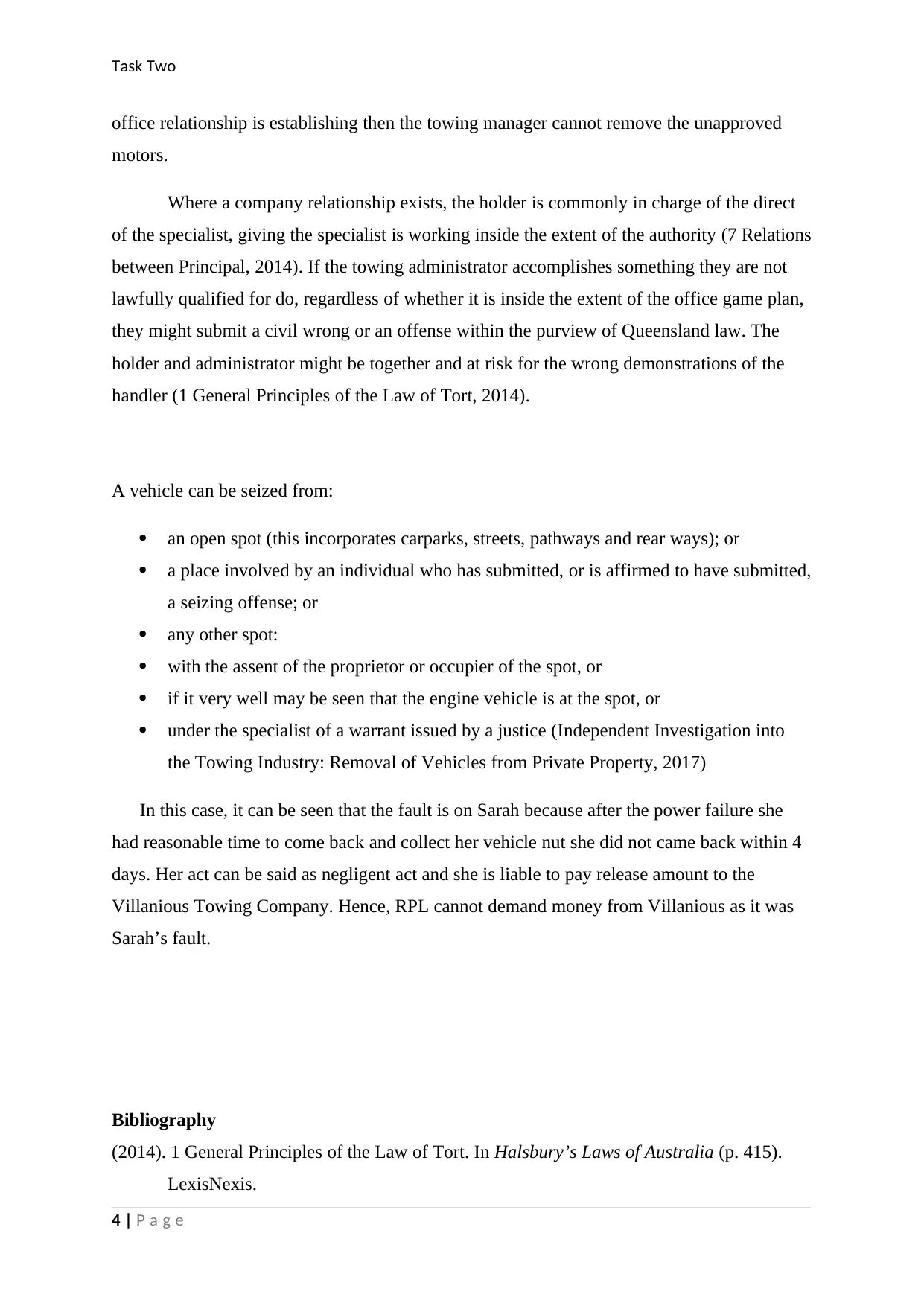
Task Two
office relationship is establishing then the towing manager cannot remove the unapproved
motors.
Where a company relationship exists, the holder is commonly in charge of the direct
of the specialist, giving the specialist is working inside the extent of the authority (7 Relations
between Principal, 2014). If the towing administrator accomplishes something they are not
lawfully qualified for do, regardless of whether it is inside the extent of the office game plan,
they might submit a civil wrong or an offense within the purview of Queensland law. The
holder and administrator might be together and at risk for the wrong demonstrations of the
handler (1 General Principles of the Law of Tort, 2014).
A vehicle can be seized from:
an open spot (this incorporates carparks, streets, pathways and rear ways); or
a place involved by an individual who has submitted, or is affirmed to have submitted,
a seizing offense; or
any other spot:
with the assent of the proprietor or occupier of the spot, or
if it very well may be seen that the engine vehicle is at the spot, or
under the specialist of a warrant issued by a justice (Independent Investigation into
the Towing Industry: Removal of Vehicles from Private Property, 2017)
In this case, it can be seen that the fault is on Sarah because after the power failure she
had reasonable time to come back and collect her vehicle nut she did not came back within 4
days. Her act can be said as negligent act and she is liable to pay release amount to the
Villanious Towing Company. Hence, RPL cannot demand money from Villanious as it was
Sarah’s fault.
Bibliography
(2014). 1 General Principles of the Law of Tort. In Halsbury’s Laws of Australia (p. 415).
LexisNexis.
4 | P a g e
office relationship is establishing then the towing manager cannot remove the unapproved
motors.
Where a company relationship exists, the holder is commonly in charge of the direct
of the specialist, giving the specialist is working inside the extent of the authority (7 Relations
between Principal, 2014). If the towing administrator accomplishes something they are not
lawfully qualified for do, regardless of whether it is inside the extent of the office game plan,
they might submit a civil wrong or an offense within the purview of Queensland law. The
holder and administrator might be together and at risk for the wrong demonstrations of the
handler (1 General Principles of the Law of Tort, 2014).
A vehicle can be seized from:
an open spot (this incorporates carparks, streets, pathways and rear ways); or
a place involved by an individual who has submitted, or is affirmed to have submitted,
a seizing offense; or
any other spot:
with the assent of the proprietor or occupier of the spot, or
if it very well may be seen that the engine vehicle is at the spot, or
under the specialist of a warrant issued by a justice (Independent Investigation into
the Towing Industry: Removal of Vehicles from Private Property, 2017)
In this case, it can be seen that the fault is on Sarah because after the power failure she
had reasonable time to come back and collect her vehicle nut she did not came back within 4
days. Her act can be said as negligent act and she is liable to pay release amount to the
Villanious Towing Company. Hence, RPL cannot demand money from Villanious as it was
Sarah’s fault.
Bibliography
(2014). 1 General Principles of the Law of Tort. In Halsbury’s Laws of Australia (p. 415).
LexisNexis.
4 | P a g e
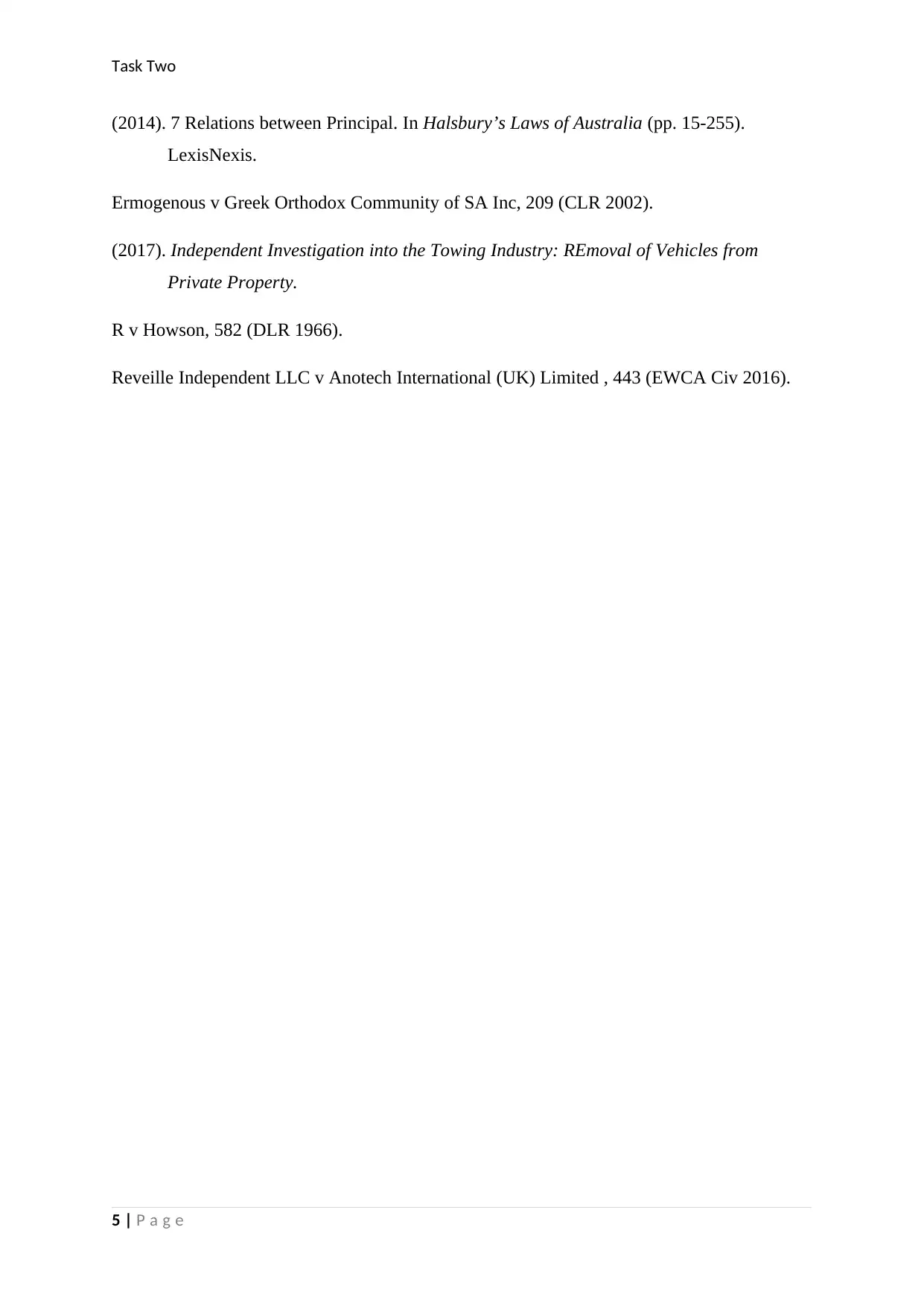
Task Two
(2014). 7 Relations between Principal. In Halsbury’s Laws of Australia (pp. 15-255).
LexisNexis.
Ermogenous v Greek Orthodox Community of SA Inc, 209 (CLR 2002).
(2017). Independent Investigation into the Towing Industry: REmoval of Vehicles from
Private Property.
R v Howson, 582 (DLR 1966).
Reveille Independent LLC v Anotech International (UK) Limited , 443 (EWCA Civ 2016).
5 | P a g e
(2014). 7 Relations between Principal. In Halsbury’s Laws of Australia (pp. 15-255).
LexisNexis.
Ermogenous v Greek Orthodox Community of SA Inc, 209 (CLR 2002).
(2017). Independent Investigation into the Towing Industry: REmoval of Vehicles from
Private Property.
R v Howson, 582 (DLR 1966).
Reveille Independent LLC v Anotech International (UK) Limited , 443 (EWCA Civ 2016).
5 | P a g e
⊘ This is a preview!⊘
Do you want full access?
Subscribe today to unlock all pages.

Trusted by 1+ million students worldwide
1 out of 6
Related Documents
Your All-in-One AI-Powered Toolkit for Academic Success.
+13062052269
info@desklib.com
Available 24*7 on WhatsApp / Email
![[object Object]](/_next/static/media/star-bottom.7253800d.svg)
Unlock your academic potential
Copyright © 2020–2026 A2Z Services. All Rights Reserved. Developed and managed by ZUCOL.





